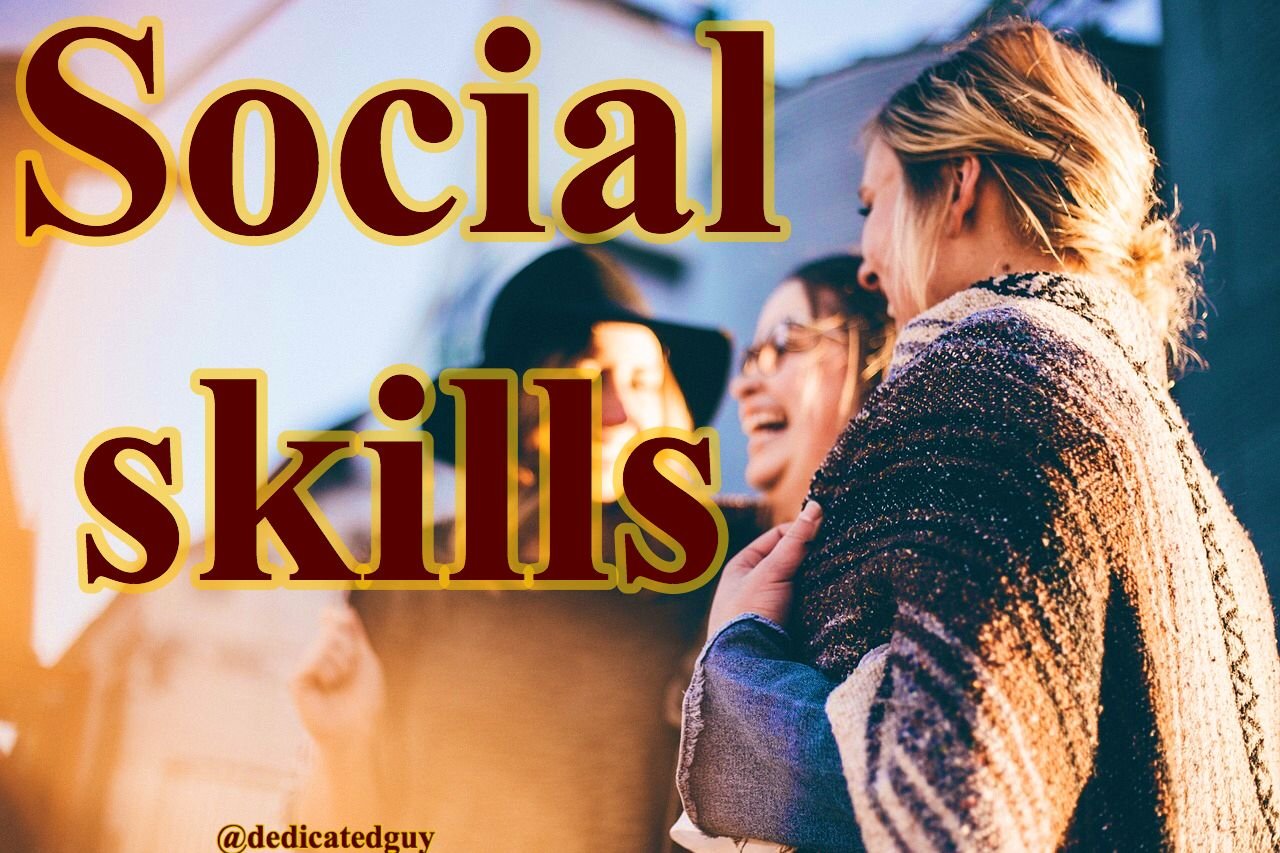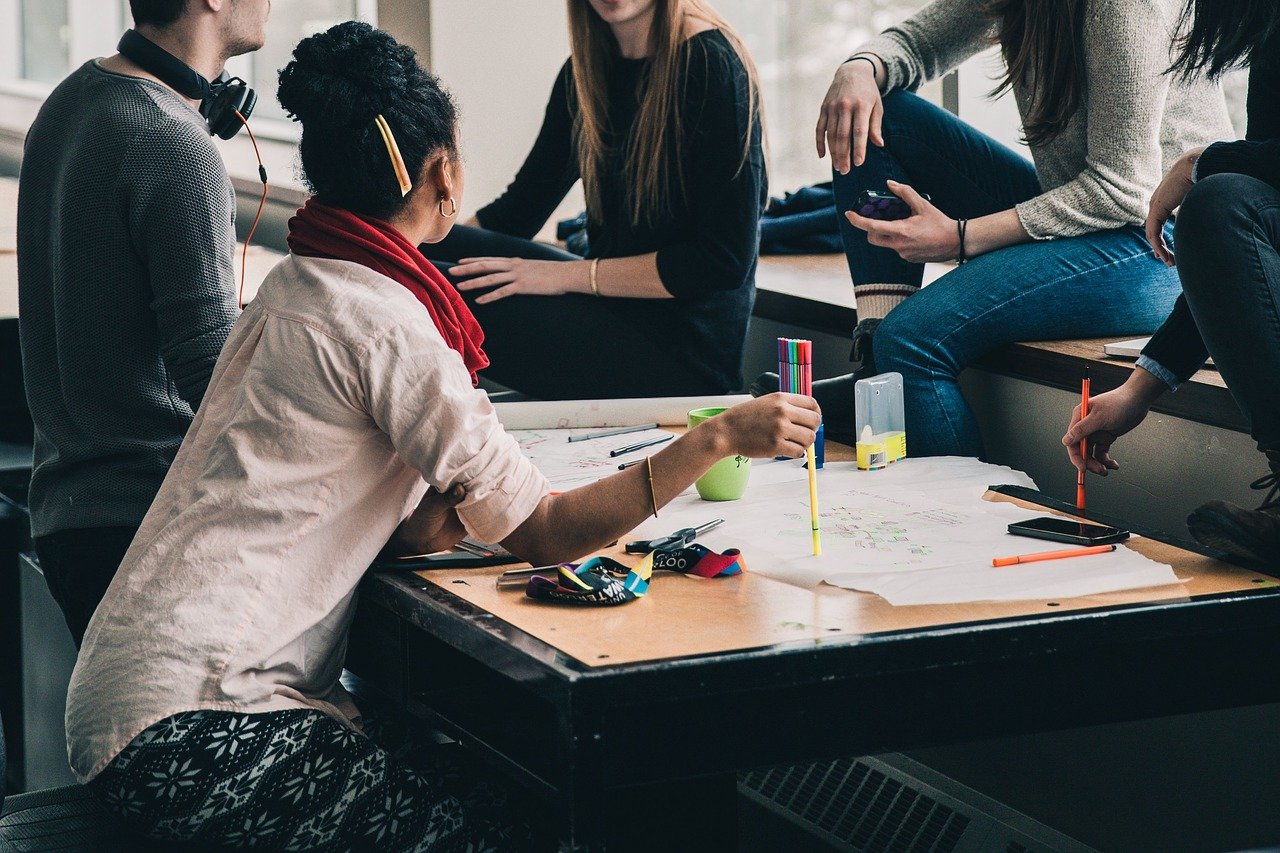
We all know people that are great when it comes to engage with others and make friends easily, and on the other hand, we also know people that find very difficult to start a conversation and interact with strangers. The truth is that, people who have the ability to properly interact with others aren’t necessarily nicer or more pleasant than people who do not have these qualities. So, what is the difference between these people? The answer is: social skills.

What are social skills?
These are the skills that allow a person to interact and to act appropriately in given social contexts. The skills include assertiveness, coping, communication and friendship making skills. | Source
Therefore, a person with social skills is one who is able to interact effectively with others, that is, figuring out problems, knowing how to express their opinion and ideas correctly, knowing how to say "no", avoiding conflicts, making criticisms or expressing their disagreement but without disturbing anyone and without being offensive.
If a person has a hard time engaging with others or, when trying it, causes a sense of rejection from the other ones present, it is probably because the person lacks social skills.
The difficulty to engage is probably caused by shyness, a feeling of shame could manifest itself when it is time to expresses oneself or interacting with people. Shame is a human sensation that comes from one's own perception of awkwardness. But obviously there is nothing wrong in making contact with others.
Sociability is characterized by:

Why do some people might feel ashamed?
Well, it can be for different reasons, for example: fear of rejection, failure, denial and, ultimately, fear of not being socially successful. These feelings and thoughts are the result of having little social skills.
However, this lack of social skills is not always the same as having a lack of interaction. Since it might be common for all of us to see that some people do not have any difficulty when engaging with others but they simply do it wrongly, so others might end up feeling offended or upset by the way they have been told something. These are people who, without intending to, can annoy others with their inappropriate comments. People with social skills are able to express opinions and ideas in an appropriate way, avoiding conflicts.

Why is it important to develop our social skills?
These skills can be of great help with our day to day encounters, either to have a good conversation with others, or to share ideas in the best way possible, or to make it more easy to approach strangers and this way, being able to meet new interesting people.
Likewise, a socially skilled person will have a greater capacity for communication and, therefore, for conflict resolution, which is extremely important in order to have a good life, since conflicts will always be there from time to time.

Without positive, durable relationships, both our minds and our bodies fall apart. | Source
A person with social skills will find it easier to achieve their goals. For example, a socially skilled person will have no problem asking for a raise or to complain in a store when there is a mistake.
Since they aren’t afraid of speaking, they have greater success forming relationships and bonding with people. This means that it is easier for them to join a group, make friends and engage in conversations with anyone. Likewise, people with social skills tend to have a greater capacity in resolving conflicts, so the quality of the interaction with others is impacted in a positive way, which allows them to develop a higher self-esteem because when a person perceives that they are socially successful and that they are able to solve problems appropriately, they feel satisfied with themselves, a conflict-free and socially optimal environment will always improve the self-esteem of any individual.

Social skills can be develop at any time
We might think that a person is socially skilled because he/she has always had that quality, which can lead us to think that it is a trait of the personality and therefore, the person was simply born with this.

That idea is wrong. Nobody is born with any skills, and this of course applies to social skills, everything is learned and developed later in life. Many people even from early ages have no problem when it comes to interact with others, this happens because they had early experiences of successful interactions thanks to their parents, that allowed them to acquire social skills since such an early age, for this skill to develop properly a good family is a must.
It is when we are very young that we learn to a greater extent how to handle relationships with others, the development of this skill continues throughout life, since subsequently social and work experiences will always add more wisdom and makes us better at it. Social skills are therefore, developed by experience, learning to act in one way or another in different situations and judging every results we get.

How come some people don’t develop this skill?
There are different reasons that could explain this. It may be that the interaction with others throughout their life has been very poor or they don’t develop the skill because of a wrong perception of how human relationships work.
It could be that they have never learned how to engage simply because they didn’t have a proper role model or because they didn’t have anyone they could observe and then learn from. An example would be a person educated in an environment with very strict standards that could cause as a final result severe issues when expressing an opinion.

These could also be people who have developed this skill but don’t use it in their daily lives, usually because of the presence of other factors that inhibit them, like the common fear of speaking in public.
If a person believes that interacting is not his/her thing, then the person will never practice nor improve that respective skill. For example, if someone continually thinks "they will not give me the promotion", they will never ask for it. Also, if a person believes that no one likes him/her, then no conversation will ever be started. A similar thing occurs with the just mentioned fear of speaking in public, which restricts the expression of the person due to the negative thoughts that interfere.

Conclusion
Social skills can be improved throughout life no matter what age we have. In the case that a person feels a great discomfort for not being able to engage or for not knowing how to do it, the best will be to approach this issue by first looking for support from close people, such as family and friends. Only then can the person’s confidence start to grow, which is the first step towards developing the skill needed.

If we really want to be the best version of ourselves, sooner or later we will have to face anything that could be affecting us. That might be a little bit demanding at the beginning, similar to when people starts to go to the gym. The beginning is the hardest part, but as time goes on, it gets easier. The same happens when developing new aspects of ourselves, such as in this case, social skills. We can get better at this by simply engaging more and practicing more, that's the only way to develop any sort of skill, practice.
After a while, engaging with others would be like a second nature to us, and the previous lack of skills we had will end up being a thing of the past.
Have you ever have problems engaging with others? If so, what did you do to fix it?
Are there any new skill do you want to develop?
References
psychologydictionary – social skills
psychology.wikia - sociability
Images sources
All images are from pixabay

If these titles sound interesting to you, I assure you the articles will be even better!

Why some people cannot control themselves when shopping?
“A day in the future”: blind people, now with better vision than you
Let’s talk about Intuitive Intelligence, taking choices thanks to our gut
Let's talk about how the unconscious can affect us in our lives
Today’s lesson: Emotions and its connection with Psychology
Why some people simply cannot stop talking?
